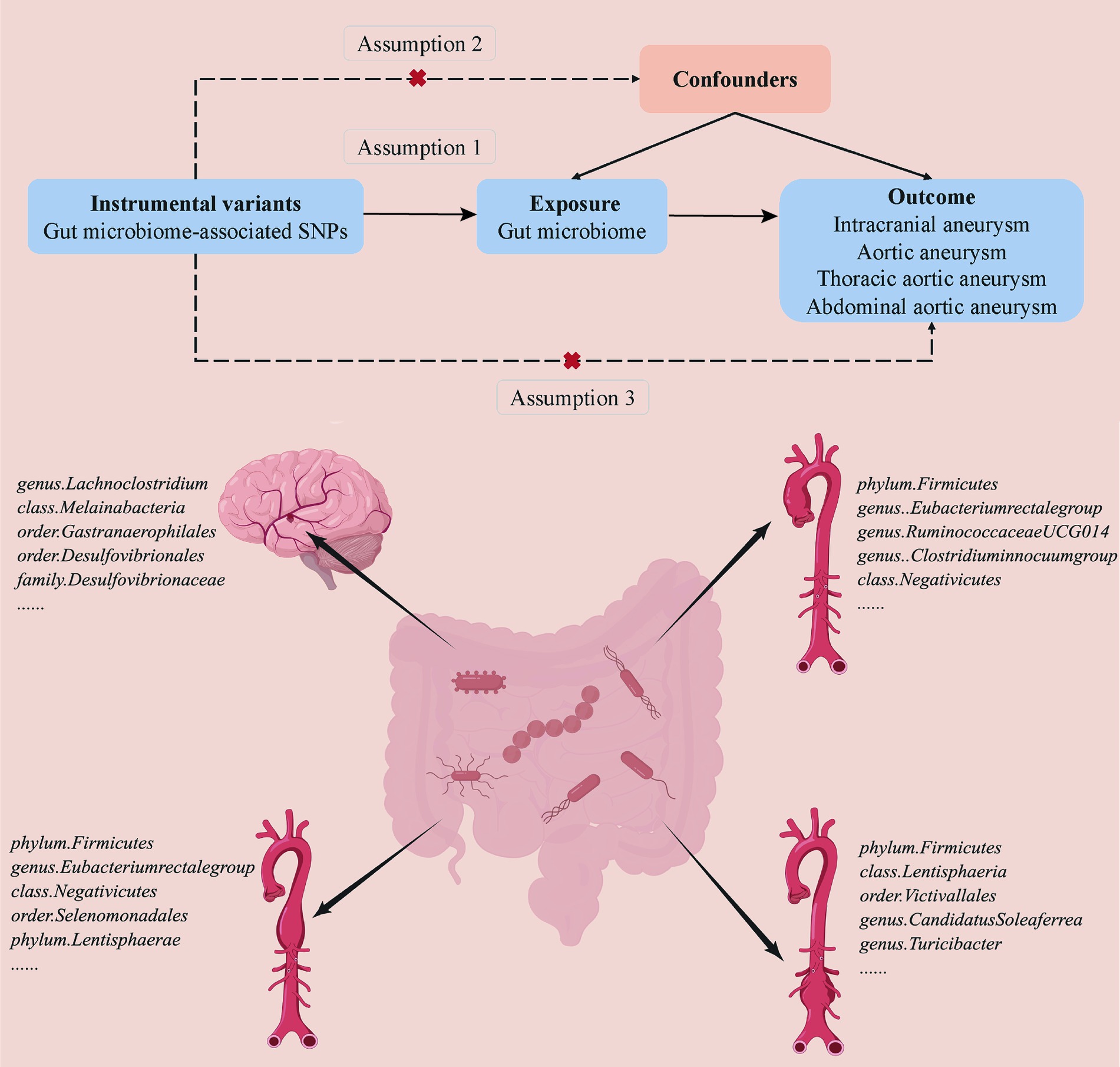Aneurysms, including intracerebral aneurysm (IA), thoracic aortic aneurysm (TAA), abdominal aortic aneurysm (AAA), and aortic aneurysm (AA), pose significant health risks and their etiology involves complex interplays of genetic, environmental, and microbial factors. Recent studies have implicated the gut microbiome (GM) in the pathogenesis of aneurysms, but the causal association remains unclear. Researchers in this study present a two-sample Mendelian randomization (MR) analysis investigating the causal effect of specific gut microbiomes on aneurysm risk.
Methods:
- Two-sample MR was conducted using single nucleotide polymorphisms (SNPs) as instrumental variables to assess causal associations between gut microbiomes and aneurysms.
- Instrumental variables were selected based on locus-wide significance level criteria.
- Primary analysis utilized the inverse-variance weighted (IVW) test, with sensitivity analysis conducted using MR-Egger, weighted median, weighted mode, and MR Pleiotropy Residual Sum and Outlier (MR-PRESSO) methods.
- False discovery rate (FDR) adjustment was applied for multiple comparisons, with significance set at p < 0.05 and q < 0.1.
- Reverse MR analysis was performed to exclude reverse causality.
Key Findings:
- Protective Gut Microbiomes Against AAA:
- Phylum 𝘍𝘪𝘳𝘮𝘪𝘤𝘶𝘵𝘦𝘴, class 𝘓𝘦𝘯𝘵𝘪𝘴𝘱𝘩𝘢𝘦𝘳𝘪𝘢, and order 𝘝𝘪𝘤𝘵𝘪𝘷𝘢𝘭𝘭𝘢𝘭𝘦 exhibited a causal protective effect against AAA.
- Decreased abundance of these gut microbiomes was associated with higher risk of AAA.
2. Specific Gut Microbiomes Associated with Aneurysms:
- Class 𝘝𝘦𝘳𝘳𝘶𝘤𝘰𝘮𝘪𝘤𝘳𝘰𝘣𝘪𝘢, class 𝘋𝘦𝘭𝘵𝘢𝘱𝘳𝘰𝘵𝘦𝘰𝘣𝘢𝘤𝘵𝘦𝘳𝘪𝘢, order 𝘝𝘦𝘳𝘳𝘶𝘤𝘰𝘮𝘪𝘤𝘳𝘰𝘣𝘪𝘢𝘭𝘦, family 𝘝𝘦𝘳𝘳𝘶𝘤𝘰𝘮𝘪𝘤𝘳𝘰𝘣𝘪𝘢𝘤𝘦𝘢, genus 𝘌𝘶𝘣𝘢𝘤𝘵𝘦𝘳𝘪𝘶𝘮 𝘳𝘦𝘤𝘵𝘢𝘭𝘦 group, genus 𝘈𝘬𝘬𝘦𝘳𝘮𝘢𝘯𝘴𝘪𝘢, and genus 𝘊𝘭𝘰𝘴𝘵𝘳𝘪𝘥𝘪𝘶𝘮 𝘪𝘯𝘯𝘰𝘤𝘶𝘶𝘮 group were negatively associated with various types of aneurysms.
- Class 𝘕𝘦𝘨𝘢𝘵𝘪𝘷𝘪𝘤𝘶𝘵𝘦𝘴, order 𝘚𝘦𝘭𝘦𝘯𝘰𝘮𝘰𝘯𝘢𝘥𝘢𝘭𝘦𝘴, and genus 𝘙𝘰𝘴𝘦𝘣𝘶𝘳𝘪𝘢 showed positive causal associations with different types of aneurysms.
3. Sensitivity Analysis and Robustness:
- Sensitivity analysis validated the robustness of MR results.
- No evidence of reverse causality was found in the analysis.
Biological Insights:
- Gut microbiomes, particularly 𝘍𝘪𝘳𝘮𝘪𝘤𝘶𝘵𝘦𝘴, 𝘓𝘦𝘯𝘵𝘪𝘴𝘱𝘩𝘢𝘦𝘳𝘪𝘢, 𝘢𝘯𝘥 𝘝𝘪𝘤𝘵𝘪𝘷𝘢𝘭𝘭𝘢𝘭𝘦𝘴, play a crucial role in modulating aneurysm risk.
- Butyrate production by 𝘍𝘪𝘳𝘮𝘪𝘤𝘶𝘵𝘦𝘴 may contribute to anti-inflammatory and antioxidant effects, potentially mitigating atherosclerosis and AAA progression.
- Phylum 𝘓𝘦𝘯𝘵𝘪𝘴𝘱𝘩𝘢𝘦𝘳𝘪𝘢, previously associated with Parkinson’s disease, demonstrated a protective effect against aneurysms, suggesting a novel therapeutic target.
- Additional gut microbiomes like 𝘈𝘬𝘬𝘦𝘳𝘮𝘢𝘯𝘴𝘪𝘢 𝘢𝘯𝘥 𝘌𝘶𝘣𝘢𝘤𝘵𝘦𝘳𝘪𝘶𝘮 𝘳𝘦𝘤𝘵𝘢𝘭𝘦 group may also influence aneurysm formation and progression through their metabolic and immunomodulatory effects.
Strengths and Limitations:
- Strengths include the robust MR methodology, stringent quality control measures, and sensitivity analysis.
- Limitations include the generalizability of findings to other ethnic populations, the need for further exploration of gut microbiomes at finer taxonomic levels, and potential confounding factors not addressed in MR analysis.
This study highlights the emerging role of the gut microbiome as a modulator of aneurysm risk and provides insights into potential preventive and therapeutic strategies for these life-threatening conditions.
Link to the study : https://tinyurl.com/36cexber
